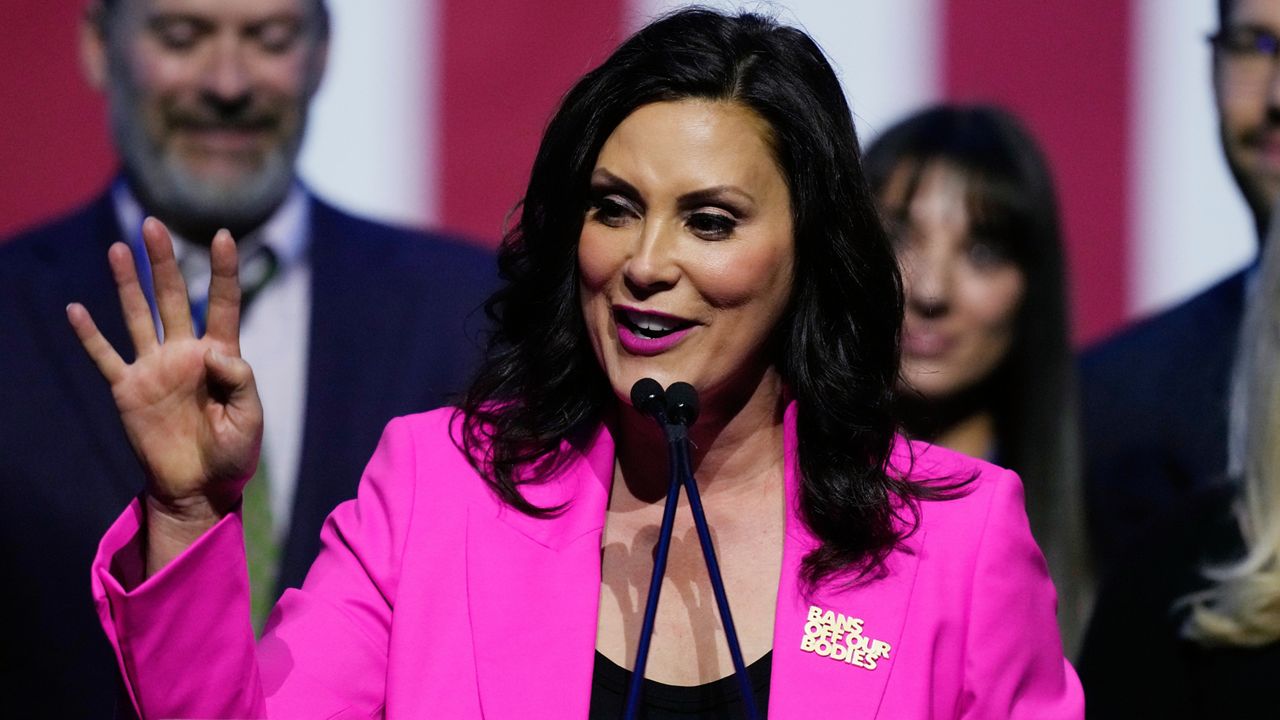Democratic Michigan Gov. Gretchen Whitmer won a second four-year term in Tuesday's election, defeating Republican challenger Tudor Dixon in the battleground state where abortion had become a key issue.
Whitmer was first elected in 2018 after years in the Legislature and has since become a leading voice in the Democratic Party, delivering the party's response to former President Donald Trump's State of the Union address in 2020. She has said in interviews that she will not run for president in 2024 even if President Joe Biden doesn't seek reelection.
Whitmer led a statewide ticket of Democrats that centered their campaigns on abortion rights after the U.S. Supreme Court's overturning of Roe vs. Wade. Whitmer filed multiple lawsuits in state courts to block a 1931 law banning abortion from taking effect.
Speaking to supporters in Detroit early Wednesday morning, Whitmer said "the prospect of leading this state for four more years is a privilege which we are incredibly grateful and excited about."
"We will always work with anyone who actually wants to solve a problem because there's nothing more important than the people of this state to us — all of the people of this state," Whitmer said.
While Michigan has been slow to bounce back from some of the country's strictest COVID policies, Whitmer has said priorities in her second-term include bringing auto jobs back to the state and helping small businesses recover.
Dixon, who was endorsed by Trump, was a former political commentator and horror-film actress who struggled until late in the campaign to compete with Whitmer's multimillion dollar campaign fund.
Whitmer spent millions on ads attacking Dixon for being too "extreme" on abortion, which went unanswered for months as her Republican opponent struggled to fundraise. Dixon, who was endorsed by former President Donald Trump, opposes the procedure in all cases except to save the life of the mother.
The Democrat also threw her support to a Michigan ballot measure seeking to enshrine abortion rights in the state constitution and overrule a 1931 law that was triggered after the fall of Roe v. Wade that would criminalize abortion. Michigan Democrats hoped the proposal would lead to high voter turnout statewide and give the party key victories in U.S. House and state legislative races.
While seemingly one-sided for months, a surge in funding from national Republicans and primetime debate performances helped increase Dixon's name recognition in a state that had a GOP governor just four years ago.
Dixon is a former commentator for a conservative online program backed by former Secretary of Education Betsy DeVos and her politically powerful and wealthy family. She won a highly contested August primary after the two predicted frontrunners, James Craig and Perry Johnson, were eliminated in a signature fraud scandal.
The Republican candidate struggled to keep up with Whitmer's multimillion-dollar campaign fund in early months, with Whitmer holding 30 times more cash on hand at the end of August. She acknowledged during an Oct. 13 debate that it was the first time many voters were hearing from her directly.
Defined early by her abortion stance and denial of the 2020 election results, Dixon tried to pivot by focusing on inflation and education. She called for banning "pornographic" books in schools and pitched an education agenda modeled after the Florida policy that critics have labeled " Don't Say Gay."
Pro-Dixon groups began airing statewide television ads for the first time in the beginning of October, attacking Whitmer for her handling of the pandemic. Dixon has said the governor was heavy handed in issuing lockdowns that hurt small businesses and the statewide economy and kept kids out of school while Whitmer claims that if Dixon were governor, "thousands more people would have died."
The economy was the top issue on the minds of Michigan voters, with about half saying it is the most pressing matter facing the nation, according to AP VoteCast, an expansive survey of more than 3,200 of the state's voters.
Nearly all the state's voters said rising prices for gas, groceries and other goods were a factor in how they voted, with half naming it as the single most important factor. And among the voters who said inflation was an issue in how they cast ballots, roughly half named rising food and grocery prices as the most important factor.
The rising prices are personal, with about a third of Michigan voters saying that their family is falling behind financially. Those voters are more likely to cast a ballot for Dixon.
Meanwhile, nearly 6 in 10 voters say their family's financial situation is holding steady. Those voters were more likely to vote for Whitmer.
The outcome of the November race is significant beyond Michigan, a presidential election battleground. The winner will be in office for the 2024 contest, and could influence voting laws and how the election is conducted. Trump, Biden and former President Barack Obama all visited the state in recent weeks to rally support for their party's candidates.
Dixon, who said during the Republican primary that she believed the 2020 election was stolen from Trump, has been vague about her attitude toward election security during the general election. When asked if she would accept the results of the 2022 gubernatorial election, Dixon said she would "look at what happens in November and make sure that the Secretary of State follows the law."
Dixon spoke to supporters just before midnight in Grand Rapids, telling the crowd that her team was anxious but excited and planned to "stay up until we have every vote counted."
"We know that this is too close to call," she said. "There are so many more votes out there and we are gonna get this done."



